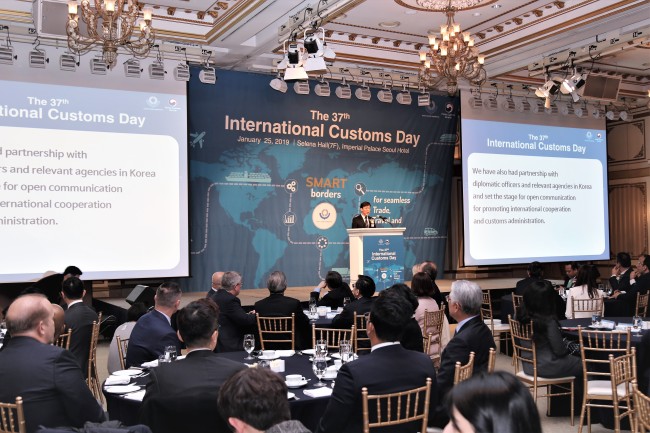ICT is key to innovation in customs administration: KCS
By Bae HyunjungPublished : Feb. 17, 2019 - 15:47
Fast-paced technological advancement and mounting challenges in the global trade environment have been pushing companies to reinforce their supply chain system and governments to innovate their customs clearance procedures.
As a technology pioneer, South Korea is seeking to add momentum to its customs administration through blockchain, artificial intelligence, big data and drone technology, according to officials of the Korea Customs Service.
“It is the KCS’ goal to create a safe trade environment and thus to contribute to the nation’s economic growth, as well as to the improvement of global customs administration,” said Kim Yung-moon, commissioner of KCS, during an international forum held in Seoul on Jan. 25.
As a technology pioneer, South Korea is seeking to add momentum to its customs administration through blockchain, artificial intelligence, big data and drone technology, according to officials of the Korea Customs Service.
“It is the KCS’ goal to create a safe trade environment and thus to contribute to the nation’s economic growth, as well as to the improvement of global customs administration,” said Kim Yung-moon, commissioner of KCS, during an international forum held in Seoul on Jan. 25.

The event, celebrating the 37th International Customs Day, came in line with the World Customs Organization’s latest dedication to securing the swift and smooth cross-border movement of goods, people and means of transport.
“It is essential for customs to ease the flow of goods and people across borders, turning globalization into a positive force,” said Kunio Mikuriya late last year, announcing “Smart Borders” as the WCO’s slogan for 2019.
The WCO is the world’s largest organization for customs agendas, accounting for more than 98 percent of world trade volume.
In a gesture to take part in the global initiative, Asia’s fourth-largest economy chose to focus on the “fourth industrial revolution” trend and related technology sectors, such as blockchain, AI, big data and drones.
Taking the lead in the January forum was Kang Tae-il, director general of the information and international affairs bureau, who delivered a presentation on the KCS’ e-customs clearance system and blockchain-based customs platform.
A successful example was UNI-PASS, an e-customs clearance system developed and operated by KCS, which has drastically improved cross-border distribution of cargo. Accumulated exports sales for the system surpassed $400 million as of the end of last year, as the KCS signed a deal with the Algerian government, officials said.
“UNI-PASS is a classic model that shows how information technology may create synergy in customs administration and government platforms,” the commissioner said.
“We shall continue to upgrade the system in order to keep pace with the WCO’s policy directions for smart customs.”
Also, the Korean customs office has been making tangible efforts to apply cutting-edge technologies to its administrative platform, kicking off an exclusive task force and private-public consortium in 2017 as well as running a pilot operation in 2018.
“Now that the functional qualification stage is complete, we are planning to buckle down to system development this year,” said an official of KCS.
The ongoing development projects largely involve a blockchain-based customs clearance system, AI-based X-ray reading system and big data analysis system, according to officials.
“The blockchain platform will allow all individuals to access relevant data at a glance and eventually promote the transparency of trade procedures,” the official said.
“Also, an AI-based X-ray reading system will detect illicit cargo such as drugs and weapons, and contribute to the establishment of a social safety net.”
By Bae Hyun-jung and Lee Kwon-hyoung
(tellme@heraldcorp.com), (kwonhl@heraldcorp.com)












![[Today’s K-pop] BTS pop-up event to come to Seoul](http://res.heraldm.com/phpwas/restmb_idxmake.php?idx=644&simg=/content/image/2024/04/17/20240417050734_0.jpg&u=)




![[KH Explains] Hyundai's full hybrid edge to pay off amid slow transition to pure EVs](http://res.heraldm.com/phpwas/restmb_idxmake.php?idx=652&simg=/content/image/2024/04/18/20240418050645_0.jpg&u=20240418181020)

![[Today’s K-pop] Zico drops snippet of collaboration with Jennie](http://res.heraldm.com/phpwas/restmb_idxmake.php?idx=642&simg=/content/image/2024/04/18/20240418050702_0.jpg&u=)